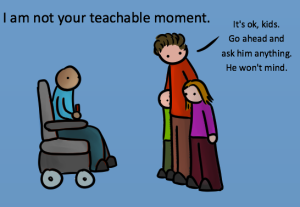
A person wearing a hijab sits at their desk with coworkers in the background. Their laptop reads “#resist.” Image source: Thinkstock; text added by Everyday Feminism.
The resistance is upon us. And thus far, it has involved a whole lot of marching.
Donald Trump’s time as president-elect and president of the US has sparked unrivaled acts of protest. His electoral college win on November 8th was followed by sustained demonstrations in the streets of major cities across the country. His inauguration crowd paled (figuratively and literally) in comparison to the hundreds of thousands of diverse protesters who took to the streets immediately after he was sworn in.
Just one day into his term, the world shook with the might of the Women’s Marches around the globe – the largest single day of action in US and in world history. Protesters swarmed airports after Trump signed his Muslim ban executive order into existence.
But marching isn’t the only way to fight back. And for some folks, it’s not within the realm of possibility.
Some of us live in areas where speaking up and speaking out in our direct communities comes at great risk. Some of us simply don’t have the emotional or physical capacity to attend a march. Some of us are working too many jobs to make it to the march.
And that’s okay.
In fact, there are lots of ways to further the cause and fight the good fight that doesn’t involve hitting the streets. Those of us who do march would do well to take note of them and invest some of our time in them, too.
There is no singular way to be an activist – and certainly, activism doesn’t begin and end at marching.
Here are five ways to make a change without even leaving the house, in most cases!
And remember: These are all about finding the activist role that’s accessible for you, so if not all of these work for you, then take what you can use and leave the rest.
We all have something to add to the movement, and none of us can possibly do it all. Play your own part, and leave what you can’t or won’t take on to your comrades.
1. Give Back with Your Time
Showing up at the rally isn’t the only way to use your time, energy, and resources to build a movement or support the communities you care about. In some cases, you may even contribute more to the cause by showing up elsewhere.
Right now, organizations fighting back against Trump are inevitably drowning. It’s been a sea of bad news and non-stop scramble to slow and stop regressive legislation and the rise of racism, sexism, xenophobia, and more.
The groups doing the work on the frontlines no doubt need volunteers now more than ever – folks who will help them manage their influx of donations, phone bank for them on the weekends, or even help them organize the next big march.
Direct service organizations are also probably seeing a flood in folks who need their help – and even if they aren’t, they always need people on deck.
Whether it’s a local intimate partner violence shelter, an LGBTQIA+ youth hotline, or a food shelter or soup kitchen, there’s an organization near you doing critical work that supports the folks who need our help just as much as they need us to agitate.
Next time you can’t make it out to a march, call up an organization in your community doing work you believe in and schedule some volunteer hours to spend your time there instead.
Even better? Donate supplies to them, too. And if that isn’t in the cards, there’s always time for the easiest and most common gesture of goodwill: donating things you don’t need anymore.
When it comes to political activism, the most effective way to make good use of time spent out on the streets may not always be marching with thousands of other activists. It may be knocking on doors.
Next weekend, find out which activist organization in your area is looking for canvassers and go out and talk to people if you’re able about the issues that matter to you – and get them to activate, organize, and vote around them, too.
2. Speak Up
Marching isn’t the only way communities get heard, and it certainly isn’t the only way individual people can make noise. There are lots of ways to speak out – and all of them are valuable in different ways.
One of the easiest ways to speak up is on social media.
Sharing important links, news pieces, and opportunities to act on Facebook, Twitter, Tumblr. The impact may be small, but it’s a good first step toward changing hearts and changing minds, and with the folks who are most likely to listen to you – your friends and family.
(Of course, since fake news/propaganda is on the rise, make sure to only share articles and memes that are from reputable sources!)
It can be scary to speak your mind online in the age of alt-right trolls and bigots, but it can also be very important.
Your friends may not know much about an issue that matters to you – but when you share something about LGBTQIA+ rights or racial justice, they’re more likely to listen and may be eager to learn more about something you care about.
Your family may disagree with you, but sharing something from the heart about your difference of opinion could make them think twice.
Social media algorithms show that people most often only engage with viewpoints they agree with.
So break the silence and speak the truth to shatter the illusion that there are no other opinions.
Conversation is where change happens. Use your time online to start one.
If that’s not your bag, I challenge you to talk to your friends, family, and community in real life. In fact, even if you’re sharing stuff online 24/7, you should still be talking to your friends, family, and community.
When you hear someone say something offensive, speaking up is an act of protest. When you find yourself involved in a conversation about politics with your friends, it’s more imperative than ever that you speak your mind.
Silence is complicity. Speaking up as much as possible and in as many scenarios as possible is where this revolution will ultimately manifest, just as much so as it has in marches.
(On that note, speak up when event organizers reproduce oppression. Too many times, people of privilege appoint themselves in charge and speak over marginalized people, so we must hold them accountable for ensuring accessibility and equitable representation within resistance movements.)
If marches are how we talk to politicians and public figures, conversations are how we march in our personal lives.
Marches, however, are also not the only way to communicate with politicians and public figures. Signing petitions might feel too easy to be important, but petitions can have the power to effect change. I’ve watched petition campaigns shake up media, sports culture, and even political decisions. Don’t hesitate to sign one.
And when you’re mad about a sexist advertisement or an offensive plot on a television show, don’t hesitate to pick up the phone or write a letter to a company or a magazine or a television network. Feedback matters, and your input is important to the folks who are producing content.
They don’t want consumers to be unhappy – challenge them to do better and you just may be the hero who saves us from a dozen more sexist perfume ads.
3. Put Your Money Where Your Mouth Is
If you can’t “stick it to the man” at a march, try hitting ‘em where it really hurts: their wallets.
Participate in boycotts. Choose to shop local over big box chains. Shop feminist, LGBTQIA+, and POC-owned businesses. And patronize businesses whose values align with yours.
Giving and making an effort to spend differently may not feel like meaningful ways to effect change. But the truth is, those decisions can go far toward establishing momentum and spreading a message.
You may not have enough money for organic, local produce from the farmer’s market, but you may be able to more consciously reject brands owned by bigots. You may not make enough money to be a monthly donor to an organization you care about, but you might be able to give five or ten dollars when you can.
And you may not be able to do much of anything regarding money, and that’s okay! Because, hey, you could always share a post about a boycott on social media or do what’s within your means to resist the corporations you rely on, using your support for them as leverage.
Even if you’re not wealthy, your financial decisions – as part of larger movements around giving and shopping consciously – can make a difference.
Bolstering feminist businesses shows larger corporations and competing organizations that aligning with our values benefits them, and that makes an impact.
Boycotting businesses who donate money to causes you don’t believe in or who utilize discriminatory policies is an effective way to hold them accountable. When enough people do it, they sure do pay attention.
Practicing what you preach as a consumer can be difficult, but if it’s possible for you financially and logistically, it can make a difference.
And if you can’t march, but you can give, you should. Give money to the groups who need it. Give money to the organizations doing work you respect.
There is a plethora of organizations at every level doing work that changes the world every single day. Giving can support the kind of critical work that needs to be done.
That could mean supporting local community organizing that puts into place an infrastructure for a sustainable fight for progress. It could mean donating to an activist organization instead of charity. It should mean looking out for who’s leading the resistance – and often, who’s getting the least credit.
Look up the organizations in your local community that are tackling issues you care most about, then ask them exactly how they take action and plan to make change. Find out who stood with your candidate in the election.
Figure out which messages and voices you want to elevate. (Hopefully, you’ll chose to amplify those of marginalized folks!)
4. Smash the System
Marching sends a strong message about our political agenda and the issues we care about. But another effective way to smash the system is to engage in it – thoroughly and consistently.
If you’re a Twitter user, chances are that you’re already aware of how to reach out to your elected officials. Call scripts are tweeted out frequently, and so are the phone numbers of the people who are heading up legislation and efforts in Congress to rewind progress.
Calling your Congressional representatives has never been more en vogue. Join the party! Research the legislation impacting your communities and the issues you care about, pick out some important facts, build a case, and write a call script. (Or check out some here.)
Call your representatives every single day. Use online resources like #Fight Trump, The Indivisible Guide, and Action Network’s 10 Actions in 100 Days to figure out a plan forward and take small political actions every week.
When elections happen, you can pick positions and candidates and speak up and out for them. You can also encourage your friends to be involved and get your peers excited. Urge that those who need representation the most are showing up.
You can also vote if you feel so inclined.
Of course, voting is not a perfect solution. It’s not something to which everyone has equitable access. It’s not always a step toward revolutionary, sweeping, big-deal changes, thanks especially to gerrymandering and voter suppression.
But for those of us who can and have the privilege to vote, it can be an important way to maintain progress and safeguard the future.
Vote for what you believe in to demand accountability. There is no greater leverage than calling your congressperson to say, “I voted for you, and now I want you to x.” Vote so that you can remind someone that they owe you something in exchange for your support.
Remember: They’re public servants. Their job is to serve you.
5. Otherwise Support Marches
If you can’t come to the march or choose not to march for whatever reason, that doesn’t mean you can’t support the aims of the organizers, the folks on the ground, or the agenda at hand. There are lots of ways to support on-the-ground activism without getting lost in the crowd.
One of the easiest and most important things you can do to support on-the-ground activism is to spread the word about it.
The Women’s March started as a Facebook post. Next time you hear about a march or rally in your area, share information about it on social media.
For example, even if you can’t make it in person to the March for Science, you can use #ScienceMarch on Twitter to show support for its mission.
When your on-campus group organizes a protest, volunteer to hang the flyers around campus.
Marches are about numbers, and those numbers impact the success of the event – and thus, your opportunity to advance the things you believe in. If you can’t make it, send five people in your stead. Additionally, check and see if a march or rally has the option to attend virtually, as this also adds to the total number of participants.
You can also donate to march fundraisers, pledge to support marchers, volunteer at a march, or help organizers out by hosting sign-making parties or doing some of the heavy lifting behind the scenes. You can design posters. You can reach out to potential sponsors.
There’s so much you can do to support the resistance without actually having to march.
Depending on your skill set, abilities, or interests, it could be a job perfectly suited for you.
***
I hope that in the coming days, weeks, months, and years, we don’t stop marching. I hope we don’t stop resisting.
I hope that Donald Trump looks out his window every morning and sees protesters. I hope he knows to expect us. I hope every single thing he does to unravel democracy, threaten the most vulnerable, and roll back civil rights progress is met with loud and raucous shouting in the streets.
But I also hope that those of you who don’t march feel like a part of something.
I hope you feel like you can contribute. I hope you feel like you can have an impact. And I hope you make as much a difference as you can, whether or not you march, and even if you do.
We can all do more. We can all do better. Whether or not we march, we can all do something.
As we enter into this new administration, we simply must.
[do_widget id=’text-101′]
Carmen Rios is a Contributing Writer for Everyday Feminism. She splits her time disparately between feminist rabble-rousing, writing, public speaking, and flower-picking. A professional feminist by day and overemotional writer by night, Carmen is currently Communications Coordinator at the Feminist Majority Foundation and the Feminism and Community Editor at Autostraddle. You can follow her on Twitter @carmenriosss and Tumblr to learn more about her feelings. Read her articles here.
Search our 3000+ articles!
Read our articles about:
Our online racial justice training
Used by hundreds of universities, non-profits, and businesses.
Click to learn more




















